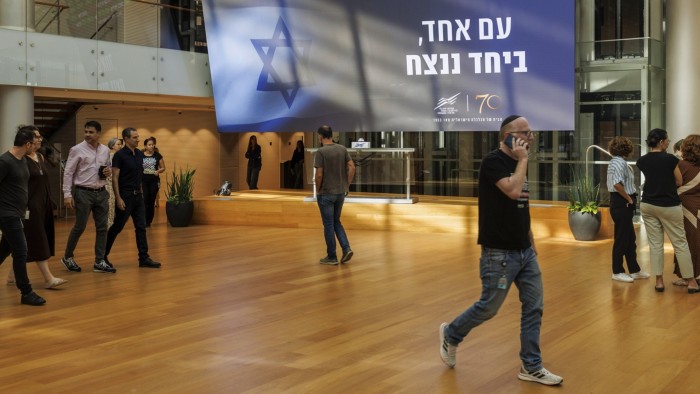Unlock the Editor’s Digest for free
Roula Khalaf, Editor of the FT, selects her favourite stories in this weekly newsletter.
Israeli stocks have surged to record highs during the country’s war with Iran, as investors bet that Israel will emerge from the conflict more secure.
Tel Aviv’s blue-chip TA-35 index has risen 6.8 per cent since Israel first launched strikes on Iran in the early hours of June 13, and hit a fresh record after the US bombed Iranian nuclear facilities on Sunday.
The TA-35 and the broader TA-125 — which has risen 8 per cent over the period, hitting a record high after Tuesday’s ceasefire — are the two best performing equity indices across Europe, the Middle East and Africa over the past month.
“This is the big one, this is the big war,” said Elliot Hentov, head of macro policy research at State Street Global Advisors. While a shadow war with Iran was posing a threat to Israel, the events of the last couple of weeks mean that “a lot of things are de-risked,” he said.
“As an investor, I’d think for the coming few years it means a much quieter horizon,” Hentov said.
Ronen Menachem, chief markets economist at Israel’s Mizrahi Tefahot Bank, said that whereas “everyone was asking when Israel would attack Iran” before the conflict began, “this source of uncertainty has vanished.”
He added: “Investors here in Israel and in external markets are expecting that the confrontation between Iran and Israel will end in a way that will eliminate the nuclear threat [to Israel].”
The TA-35 has returned more than 60 per cent over the past two years, despite a grinding war with Hamas and battles in Lebanon, Syria and now Iran all unfolding in that period.
“The war has not impacted the fundamentals of companies in our coverage. In fact, we estimate that fundamentals have never been stronger, thanks to strong discipline and execution,” said Tavy Rosner, head of Israel equities research at Barclays.
“The rally seen over the past week reflects investors’ belief that current events will not change the paradigm and that companies will keep on delivering,” added Rosner.
Financial services stocks, which count for nearly one-third of the market cap of the TA-35, jumped after the ceasefire was announced on Tuesday morning. First International Bank of Israel gained 4.4 per cent and Clal Insurance rose 6.9 per cent.
Real estate companies also gained on news of a ceasefire, which Menachem said was a result of the need for rebuilding following missile damage. Builder Amot Investments rose 2.8 per cent while Ashtrom Group gained 5.8 per cent per cent.
The stock market gains have accelerated in the last two weeks, since the conflict with Iran began. Menachem said that while an upwards move did not come as a surprise, the size of the move was unexpected.
Recommended
Gustavo Medeiros, head of research at Ashmore Group, said the all-time highs in Israeli stocks reflected a shift in how investors view the long-term risks from the region, especially to Israel, “with the US now more directly involved”.
He added: “Iran’s regional influence and options for forceful retaliation appear diminished now Israel has severely weakened Iran’s two main proxies, Hamas and Hizbollah.”
Some investors warned that geopolitical risks in the Middle East are likely to remain elevated, and the risk of a deeper conflict between the two long term foes remains. “The uncertainty is likely to persist” over the medium term, said Matthias Scheiber, multi-asset head at asset manager Allspring, saying it was unclear if Israel’s military goals had been fully achieved.
After Israel and Iran agreed to a US-brokered ceasefire on Tuesday, the Israeli shekel rallied to its strongest level since early 2023, strengthening 1.4 per cent to trade at 3.396 to the dollar.
Menachem said the strength of the shekel “mirrors the strength of the economy, the prospect of growth, sound monetary policy by the Bank of Israel”, as well as the relatively weak dollar.
“If the surrounding [geopolitical environment] will be less negative than before the war, it is a very good point to start investing in Israel,” he added.

